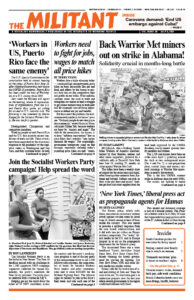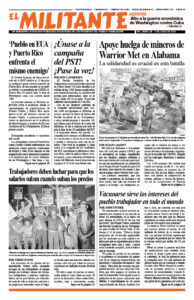Worried that its population is aging and there won’t be enough young workers to exploit to maximize state profits, the Chinese government announced last month that it was raising the limit on the number of children a family is allowed to three and began a propaganda campaign to encourage more childbirth. Now Beijing officials are considering dropping all restrictions on larger families.
The Chinese rulers fear that having a shrinking and aging population is a barrier to challenging Washington for greater economic and political influence.
Government interference in the personal decisions of when, if and how many children a woman has is reactionary. These decisions should be in her hands alone in conjunction with her family. To make that possible it is necessary to fight for access to family planning, including aid in conceiving a child if needed and the right to safe and secure abortion.
At the beginning of the 1970s the Maoist regime in Beijing pressured women to have fewer children. In 1979 government bureaucrats imposed a general cap of one child per woman. Those who violated the law had to pay huge fines or were forced to have abortions.
At the end of 2015, with Chinese women averaging only 1.05 children, the second lowest in the world, Beijing raised the cap to two. That did little to increase the birthrate. In China, just like in the U.S., the U.K., France and other countries, birthrates have been declining for years.
The decline in workers’ real wages, the rise in the cost of living and lack of child care, a result of the bosses foisting the capitalist crisis on the backs of working people, are also key to the decline in family formation worldwide. Even in the United States, the strongest imperialist power, many young workers today can’t earn enough to live on their own, so they put off having children.
An affordable family is even harder to establish in China with low wages, sky-high rents and mortgages, and meager pensions. Child care as well as nursing homes and other facilities for seniors are further out of reach for working people there than in the U.S. And it’s women who face the biggest burden, with the responsibility for children and the elderly falling almost entirely on the family.
When Xinhua News in China published the results of a poll that asked 22,000 people, “Are you ready for the three-child policy?” Twenty thousand chose, “I won’t consider it at all.” The poll was quickly deleted from the agency’s website.
Working-age couples in China often have to take care of “two sets of parents who don’t have much income for savings or pension plans if any, plus any kids they already have,” reports Al Jazeera.
While the rulers in Beijing are trying to get women from the majority Han population to have more babies, they subject women among the mostly Muslim Uighur people in the Northwest to strict birth control policies. Long discriminated against and persecuted by Beijing, Uighurs often face forced sterilization and abortions, reports The Associated Press.
This goes hand in hand with Beijing’s systematic detention of hundreds of thousands of Uighurs in forced labor camps.

